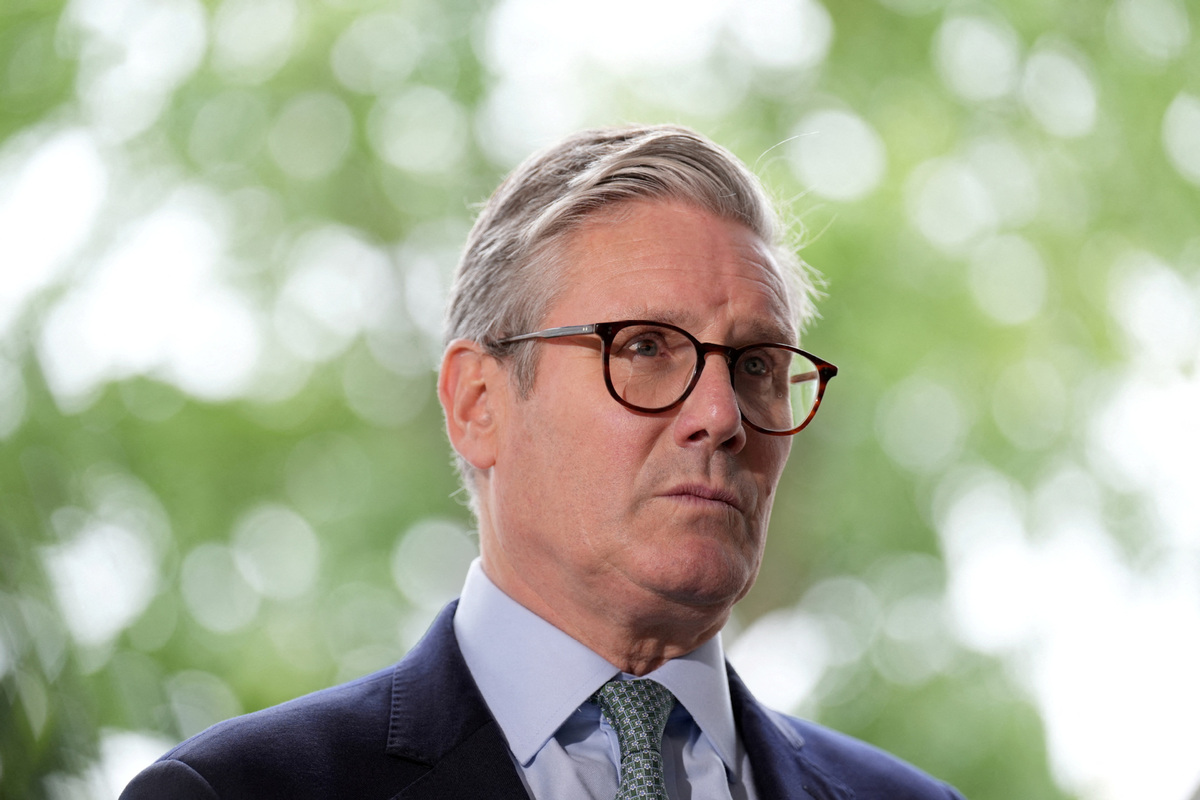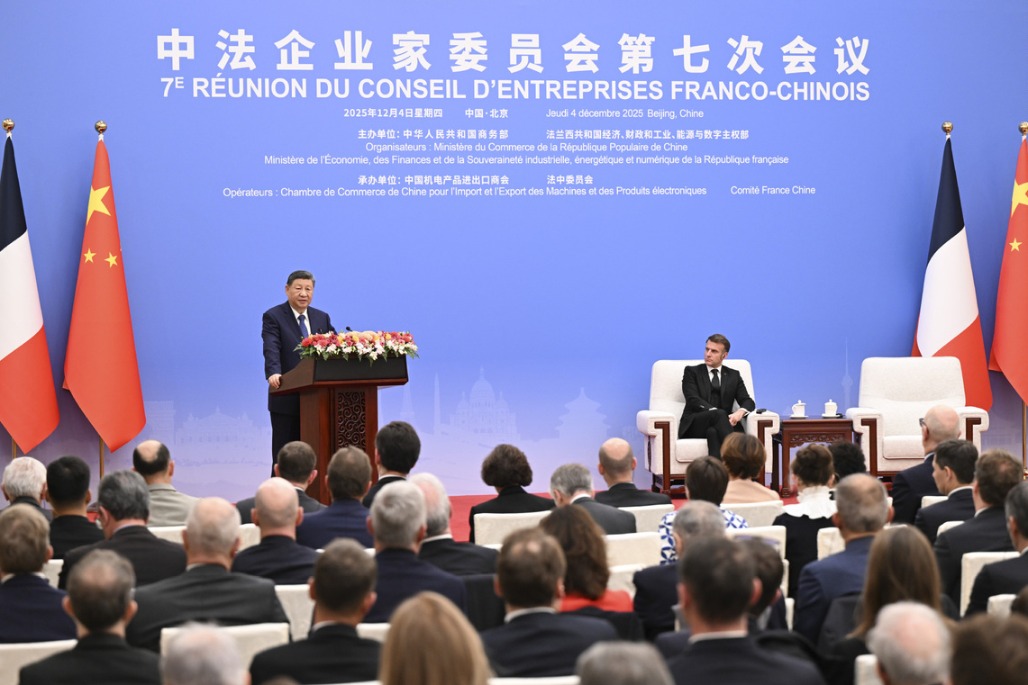Starmer recalibrates UK foreign policy for global justice
By Grenville Cross | China Daily Global | Updated: 2024-08-15 09:22

After the Hamas attack on Israel on Oct 7, Israel stopped the entry of food, fuel and medicine into Gaza. When asked by a London-based radio station on Oct 11 if the cutting off of power and water was appropriate, Keir Starmer, leader of the Labour party, said, "Israel does have that right." Although he qualified this by adding "everything must be done within international law", people were aghast.
However, since entering 10 Downing Street as Prime Minister on July 5, Starmer has shown fresh thinking over Gaza. He has not only broken with the approaches of his predecessor, Rishi Sunak, but also distanced the United Kingdom from the United States. And it is not hard to see why.
On July 5, medical journal The Lancet reported that, as of June 19,37,396 people had been killed in the Gaza Strip since Israel's full-scale invasion began on Oct 27. It also pointed out that the true death toll could reach over 186,000 people, almost 8 percent of Gaza's prewar population of 2.3 million.
This was because the official figure did not include the thousands of people buried under rubble and the indirect deaths due to the destruction of health facilities, food distribution centers and other public infrastructure.
The United Nations Office for the Coordination of Humanitarian Affairs, a relief agency, also reported that thousands of Palestinians were trapped in eastern Khan Younis "amid intense casualties", and that rescue teams were "unable to reach them due to the denial of access by the Israeli military".
It came, therefore, as no surprise that, on May 20, Karim Khan KC, the prosecutor of the International Criminal Court, filed an application for warrants of arrest against Israeli leaders for alleged war crimes in Gaza, but also against Hamas leaders for their alleged offenses in Israel on Oct 7.
Khan said that he had "reasonable grounds" to believe that Israeli Prime Minister Benjamin Netanyahu and his Defense Minister Yoav Gallant, bore "criminal responsibility" for "war crimes and crimes against humanity". Their actions allegedly included willful killings, willfully causing great suffering or serious injury, intentionally directing attacks against a civilian population, using starvation as a method of warfare, and "other inhumane acts".
Apart from Netanyahu and Gallant, Khan also sought arrest warrants for three Hamas leaders, Yahya Sinwar, Mohammed Deif and Ismail Haniyeh (Deif and Haniyeh have since been assassinated by Israel). This arose out of their alleged involvement in the killings of at least 1,200 Israelis on Oct 7 and the seizure of hostages.
Once Khan announced his applications, the US reacted with fury. The last thing it wanted to see was its proxies being held accountable in a court of law. Not surprisingly, the Sunak government tamely played along.
The UK's coffers have benefited from the conflict, and it has exported arms worth over 576 million pounds ($736 million) to Israel since 2008. This helps to explain why Sunak sought to undermine the ICC, although he stopped short of joining the US in maligning Khan, a British barrister.
However, the US was not able to formally challenge Khan's applications because it is not a party to the Rome Statute (which created the ICC). It had to rely on Sunak.
Accordingly, Sunak indicated that the UK would challenge the ICC's jurisdiction to prosecute the two Israeli leaders. This, as his lawyers should have explained, would have led nowhere, as Palestine became a state party to the Rome Statute in 2015. Although Israel is not a party, the ICC can still hold it accountable because of the Rome Statute's provision that enables it to assume jurisdiction if a nonmember state commits crimes on the territory of a member state.
However, with the UK's change of government, a more responsible stance has emerged. Starmer's government has indicated it will not be pursuing Sunak's objections to the ICC's jurisdiction. This is hopefully an indication that, with his legal background, Starmer appreciates that the legal order must be respected and that the UK can have no truck with squalid politicking.
Israel's spokesperson said it was "deeply disappointed by this fundamentally wrong decision". The legal officer for the International Centre of Justice for Palestinians, Zaki Sarraf, saw things differently. He said, "Respecting the jurisdiction and independence of the ICC is the least the Labour government can do to demonstrate a genuine commitment to justice and accountability."
Although Sunak's government suspended aid for UNRWA, the UN's relief and human development agency in Palestine, Starmer has now renewed it.
As Starmer appreciates, his responsibilities do not end there, and his government must also respect the rulings of the International Court of Justice.
On July 19, the ICJ, following a referral by the UN General Assembly in 2022, ordered Israel to end its "unlawful" occupation of Palestinian territories "as rapidly as possible", and to make full reparations for its "internationally wrongful acts".
The ICJ also advised that other states are under an obligation not to recognize the occupation as lawful nor to aid or assist it.
US President Joe Biden has cynically purported to show his concern for civilians by saying he would only be supplying Israel with 500-pound (226.7-kg) bombs to drop on Gaza, and that the supply of 2,000-pound bombs would be paused. By authorizing a review into Israel's compliance with international humanitarian law, Starmer has shown he appreciates that whatever the weight of the bombs being dropped, the situation is intolerable, and Israel can no longer enjoy carte blanche.
The UK is now expected to honor the ICJ's ruling and suspend at least some of its arms exports to Israel in the near future.
Everybody who believes that the UK should pursue an independent (and honest) foreign policy will be gratified that Starmer is prepared to place clear blue water between the UK and the US over Gaza. As a former prosecutor and human rights lawyer, it appears he is not prepared to allow Israel to carry on killing Palestinians with impunity.
Although the US has encouraged Israel's excesses every step of the way, its allies are gradually realizing that enough is enough. Although its complicity is horrendous, this is only one facet of Washington's global strategy. In Ukraine, it is also deliberately prolonging the conflict, hoping to destabilize Russia and seeking, through its proxies, to provoke a conflict with China in the Far East.
As Starmer has recognized the bankruptcy of US policy in the Middle East, this is hopefully just the start. He must also wise up to the enormity of its destructive policies elsewhere. Although his predecessors blindly followed the US, Washington has done London few favors in recent years. It even failed to give the UK a post-Brexit free trade deal despite the much-vaunted "special relationship".
Therefore, Starmer must have the courage to pursue a foreign policy that is not only enlightened but also advances the British national interest and respects the international rule of law.
Although Starmer never supported Brexit, he must now ensure the UK can take advantage of its opportunities. However, to do so, the UK must show it is capable of walking tall on the world stage, is beholden to nobody, and is no longer blinded by ideological hang-ups. At the same time, it should develop good relations with the countries that can help it to make the most of its hard-won independence from the European Union, even if they are not traditional allies.
If Starmer can achieve these objectives, he will have succeeded where his predecessors, Boris Johnson, Liz Truss and Rishi Sunak, failed, and people of goodwill will wish him well.
The author is a senior counsel and law professor, and was previously the director of public prosecutions of the Hong Kong Special Administrative Region.
























